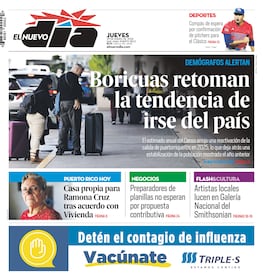The recent arrests of five correctional officers who, according to police investigations, are linked to drug trafficking from the Bayamón Correctional Complex, once again highlight the urgent need for authorities to put an end to the serious problem of contraband in prisons.
---
Lee este artículo en español.
---
With the arrests reported during the first half of this month, a total of 11 correctional officers have been arrested this year for criminal acts. In May, there were four other arrests of prison guards for acts related to the trafficking of controlled substances and firearms. In addition, according to the Department of Corrections and Rehabilitation (DCR), between March 2024 and 2025, $4.8 million in contraband was seized, including 8,991 controlled substances, 8,299 cigarettes, and 862 cell phones, in addition to thousands of other items prohibited in prisons.
In a penal system with an average population of 7,000 inmates, these are clearly alarming figures that point to a serious problem of contraband and corruption within the prison system. We urge the DCR and the entire state apparatus to give this issue the importance it deserves and to take the necessary measures to restore order and legality to prisons.
A first and very important step, of course, is to improve the selection process for correctional officer candidates. Even Jessica Martínez, president of the Alianza Correccional Unida (ACU), the union that represents correctional officers, says that candidate background checks are “vague” and that there are known groups of inmates who send people they trust to apply for jobs as guards.
Security protocols in prisons are so strict that it would be almost impossible to smuggle anything in without the complicity of officers. This applies even when visiting relatives attempt to commit the crime; without the complicity of a guard, it is almost impossible to get the prohibited material or items to the inmate.
Once recruited, officers need better salaries, equipment, training, and effective supervision to reduce the temptations and even the opportunities to participate in criminal acts. Since these are officials who perform their duties in a single, specific location, effective supervision should not be too difficult.
The DCR also needs more resources and technology to combat the type of contraband that is not related to official corruption, such as drug packages dropped from drones. We believe that preventing such devices from flying over penal institutions is not an impossible task.
Prisons should be the place where every breath, both of inmates and officers, is most strictly monitored and controlled. Everything that is done in prisons is subject to the strictest protocols. In short, there is no excuse for not eradicating contraband. We applaud the efforts of Secretary Francisco Quiñones Rivera to try to bring this situation under control and urge him not to give up on his efforts.
The Constitution of the Commonwealth provides that the purpose of incarceration is rehabilitation. To the extent that prison officials cannot prevent drug smuggling into prisons, the spirit of rehabilitation that must exist in the system is undermined.
At the end of the day, the release of individuals with addiction problems equal to or worse than those they had when they entered prison is detrimental to society as a whole, which greatly needs the State to make every effort within its power to rehabilitate the individuals it takes into custody for having committed crimes.
No course of action other than complying with the responsibility imposed on the prison system by the Constitution is acceptable.
---
This content was translated from Spanish to English using artificial intelligence and was reviewed by an editor before being published.


